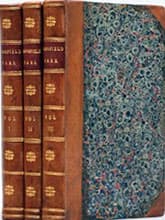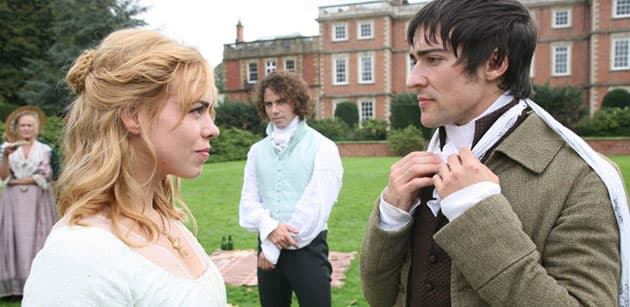Mansfield Park
Critique • Quotes • Text • At the movies
 1816 second edition
1816 second editionFirst publication
1814
Literature form
Novel
Genres
Literary, romance
Writing language
English
Author's country
England
Length
Approx. 160,000 words

Fanny and Edmund play as Crawford looks for his own chance in the 2007 film ofMansfield Park.
Fanny in the middle
Mansfield Park (2007): Television film, 90 minutes; director Iain B. MacDonald; writer Maggie Wadey; featuring Billie Piper, Blake Ritson, Douglas Hodge, Jemma Redgrave, Hayley Atwell, Joseph Beattie
While the 1983 series recreated Jane Austen's Mansfield Park in painstaking and sometimes painful detail and the 1999 movie updated the story nearly beyond recognition, the third major adaptation lands somewhere between those two extremes.
In doing so, the British television film managed to both annoy Austen purists for diverging from the original text and disappoint millennial viewers for losing its edge.
This response is a shame. One gets the idea from reviews, both critical and popular, that most people failed to appreciate the success of the film's balancing act. It is quite successful in presenting a problematic Austen novel in a manner that is faithful to the author's general ideas, as well as entertaining to a modern audience—if they give it a chance.
The character of Fanny, essayed by Billie Piper, is also a victory of moderation. Gone is the timid, retiring "mouse-creep" of the 1983 series (and the 1814 novel) but also forgone is the liberated woman of the 1999 film. This Fanny is outgoing without being bold, sexual without being brazen, and thoughtful without being moralistic.
This playful persona does bump up against some of the novel's plot requirements, such as Fanny frowning on the production of a slightly scandalous drama. But for the most part it's pleasing.
It also fits the removal of the ball scene, which has dismayed some Austen stalwarts as they consider it central to the story's narrative. But it makes sense for this Fanny to turn down the ball with its awkward dancing and prefer a picnic with its games, which also serve to bring out the characters' relationships. Besides, haven't the overly choreographed ballroom scenes we've seen in countless costume dramas become such a boring cliché?
Trailer for the 2007 British television film of Jane Austen's Mansfield Park.
In this modified lead role role, Piper, best known as a former British pop star and as a recurrent figure in Doctor Who, is actually quite good. As is the rising young British actor Blake Ritson as Edmund, in a role closer to the character's original conception.
With the necessity of skipping huge chunks of the novel to fit it into ninety minutes, the lesser characters don't get enough screen time but what we do see of the Crawfords (Hayley Atwell and Joseph Beattie) and the elder Bertram (David Hodge and Jemma Redgrave) is well done.
One note that strikes wrongly though is the brief interchange at the dinner table between Fanny and Sir Bertram over the slave trade that benefits the family. If this is raised at all, shouldn't it be dealt with at greater length in the film, as in the 1999 version? Instead Bertram just explains he is of course opposed to slavery but we also need to maintain order—whatever that means. And that's it. The issue is cleared away and the internal personal dramas of the wealthy family carry on.
This is one instance when the balancing act doesn't quite work.
But we soon recover from it. By the end of the film, as in all the wildly diverse Mansfield Park adaptations, we are so invested in the lead characters as to be sincerely moved by the meeting of true hearts and minds.
— Eric

